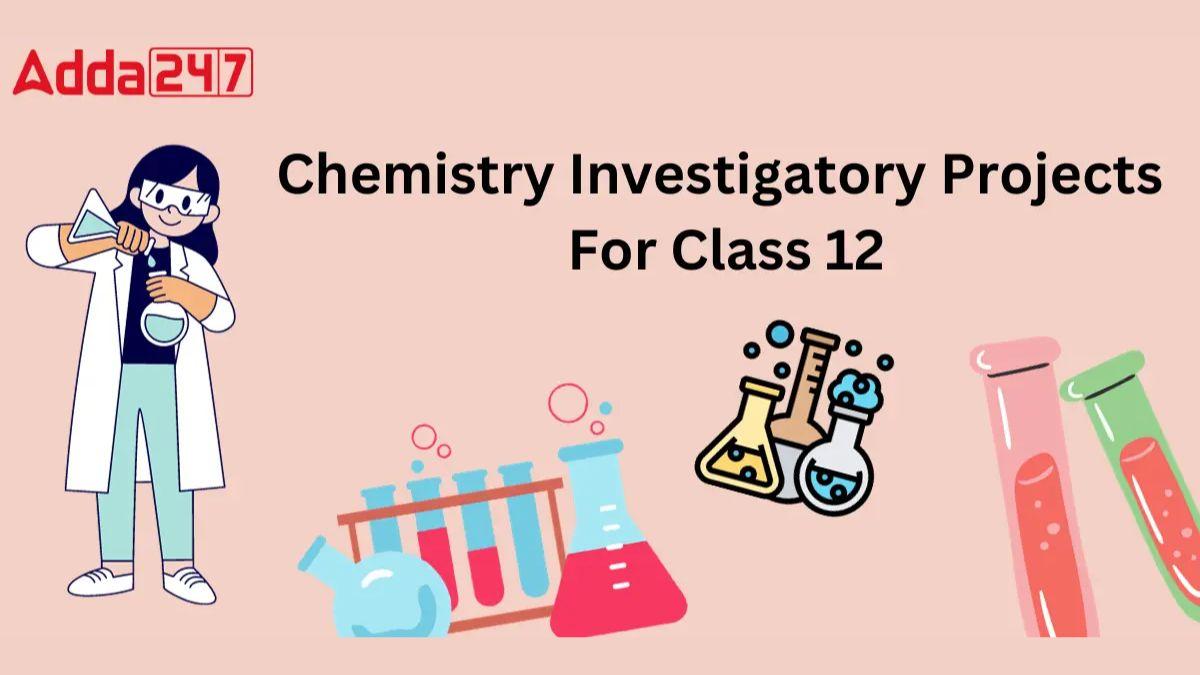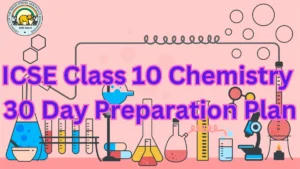Table of Contents
The Chemistry Investigatory Project Class 12 Curriculum is very crucial that help the students comprehend the basic topics. Chemistry is one of the most scoring and interesting subjects in the field of science. Since chemistry plays a role in almost all aspects of our daily lives, learning how chemical processes impact our lives is intriguing. You have come to the proper place if you’re looking for intriguing Chemistry Investigatory Project topics and need help with them. Here, we are ready to assist you with a comprehensive list of appreciated Chemistry Investigatory Project Class 12 Topics complete with all the necessary information.
Chemistry Investigatory Project Class 12
It is remarkable that chemistry affects almost every aspect of our daily life. A chemistry investigatory project is a scientific investigation aimed at investigating a specific topic or concern. The Chemistry Project Class 12 is an important part of the CBSE class 12 curriculum. Examining the qualities of a novel material, assessing the chemical composition of a specific item, or evaluating the efficiency of a newly created technique for manufacturing a chemical compound are all examples of Chemistry Project Class 12 activities.
CBSE Chemistry Investigatory Project Class 12 Overview
| Particulars | Details |
| Name of the Exam | Central Board of Secondary Education Class 12 Board Examination |
| Famously Known As | CBSE Class 12 Board Exams |
| Conducting Authority | Central Board of Secondary Education (CBSE) |
| Level of Examination | National level |
| Mode of Registration | Offline via the school for regular students Online for private students registration |
| Registration Fees | INR 1500/- for five subjects and INR 300/- per additional subject |
| Mode of Exam | Offline |
| Class 12 Language Subjects | English, Hindi, Telugu, Kannada, Sanskrit, Tamil, Malayalam, Urdu, Bengali, Marathi, Gujarati, Punjabi, etc. |
| Class 12 Academic Subjects | Mathematics, Biology, Physics, Chemistry, Computer Studies, Social Studies, Economics, Accountancy, Political Science, etc. |
| Frequency of Exam | Once a year |
Investigatory Project in Chemistry for Class 12: Samples
The investigatory project in chemistry for class 12 includes doing research in the discipline of chemistry. Designing and executing experiments, methodically evaluating the collected results, and finally presenting the findings through a detailed report or a well-structured presentation are all part of the process of completing a chemical investigatory project. The sections that follow show some popular chemistry investigatory project class 12 ideas that students can explore in their studies.
Sterilization of Water Using Bleaching Powder
Objective: The goal of this experiment is to identify the amount of bleaching powder required for the sterilization or purification of various water samples.
Theory: With proper scientific details, bleaching powder or calcium hypochlorite [Ca(ClO)] is a relatively frequent approach to clean drinking water. The chemical is set to sit for half an hour after utilizing 5 drops of bleaching power for 2 liters of water, making it safe to drink. Bleaching powder reacts with declining levels as well and poses fewer health dangers than other chemical substances such as THMs.
Requirements: 250ml measuring flask, weight box, Burette, titration flask, 100ml graduated cylinder glazed tile, glass wool, bleaching powder, 10% KI solution, glass wool, sodium thiosulfate solution (0.1%)
Oxalate Ion Presence in Guava Fruit at Different Ripening Stages
Objective: To study the occurrence of oxalate ions in guava fruit at various stages of ripening.
Theory: Carboxylic acids, which are found largely in animals and plants, are created in our bodies through the conversion of Vitamin C to oxalate. The presence of too much oxalate in our urine might result in hyperoxaluria (kidney stones).
Requirements: Pestle and mortar, beaker, funnel,100ml. Measuring flask burette weighing machine, papers, filter, dilute H2SO4, L (N /10) KMnO4 solution.
Get CBSE Class 12 Chemistry Sample Papers With Solutions
Paper Chromatography
Objectives: Using paper chromatology, determine the ink components in black pens and markers.
Theory: Chromatology is used to separate the components of complex combinations. Ink makers combine several hues to create new ones. Paper chromatology aids in the separation of distinct components by drawing them to water or alcohol.
Requirements: 90% isopropyl alcohol, 100 mL beaker, 500 mL beaker, various black pencils and markers Wooden splints, little binder clips (2).
Surface Chemistry Colloidal Solutions
Objective: The goal of this research is to investigate the surface chemistry of colloidal solutions.
Theory: Colloids are homogeneous solutions that contain distinct phases. The particles in the dispersed phase are evenly distributed in the continuous phase. Some colloids show the Tyndall effect, which causes them to be translucent (light scattering by colloidal particles). Gums are natural polysaccharides released by tree stems. When heated with water, this soluble material hydrolyzes and produces multiple monosaccharides, resulting in a colloidal solution.
Requirements: Two beakers (250 mL and 50 mL), funnel, wire gauze, glass rod, tripod-stand, burner, filter papers, distilled water (100 mL), and 4.5 g Arabic gum are required
Casein Presence Quality in Different Milk Samples
Objective: The goal of this study is to determine the amount of Casein present in various milk samples.
Theory: Caseins are proteins that are found in milk. Sodium caseinate is the most prevalent type. When we leave milk outside for an extended amount of time, the bacteria in it convert it to lactic acid, turning it sour. In acidic conditions, milk casein begins to precipitate.
Requirements: Filter paper, Conical flask, various milk samples, funnel, Watch glass, Glass rod, Measuring cylinder (100mL), and 1% acetic acid are required.
Class 12 Chemistry Investigatory Project- Analysis of Fertilizer
Objective: The goal of this experiment is to study the refractive index of water using a traveling microscope.
Theory: Refraction is a phenomenon that occurs when the direction of light changes as it travels from one clear medium to another. A refractive index is calculated by dividing the velocity of light from one medium by the velocity of light from another.
Requirements: A beaker, a piece of paper, a coin, and a traveling microscope are required.
Chemistry Investigatory Project Class 12 Based on Latest Syllabus 2024-25
list of investigatory project ideas for Class 12 Chemistry, based on the CBSE latest syllabus. These projects cover a range of topics from organic and inorganic chemistry to physical and environmental chemistry, allowing for practical experiments and research.
1. Organic Chemistry Projects
*Preparation of Aspirin and its analysis.
*Extraction of essential oils from plants (e.g., orange peels, cloves).
*Study of the effect of metal ions on the action of soaps.
*Analysis of the adulterants in food items (e.g., turmeric, milk, honey).
*Preparation of soy protein-based plastic and its properties.
2. Inorganic Chemistry Projects
*Study of the effect of Potassium Bisulfate as a preservative.
*Analysis of different types of fertilizers and their composition.
*Study of the presence of oxalate ions in guava at different stages of ripening.
*Qualitative analysis of water samples to test for metal ions (iron, copper, etc.).
*Study of corrosion and methods of rust prevention.
3. Physical Chemistry Projects
*Determination of the concentration of sugar in soft drinks and fruit juices.
*Study of the variation of conductance in electrolytes.
*Comparison of the enthalpy of neutralization of strong acid-strong base and weak acid-strong base.
*Analysis of caffeine content in tea and coffee.
*Determination of the rate of evaporation of different liquids.
4. Environmental Chemistry Projects
*Analysis of soil quality in various locations.
*Study of air quality around school or residential areas.
*Analysis of hardness of water from different sources.
*Study of greenhouse gases and their impact on the environment.
*Biodegradability of natural and synthetic materials.
5. Polymer Chemistry Projects
*Preparation and comparison of bio-plastic with synthetic plastic.
*Study of the composition and uses of different types of polymers.
*Analysis of polyvinyl alcohol-based glue for strength and safety.
*Study on degradation rates of different types of plastics.
*Development of eco-friendly polymers from starch.
6. Biochemistry Projects
*Determination of the Vitamin C content in various fruits and vegetables.
*Enzyme activity studies (e.g., catalase activity in potatoes).
*Study of glucose levels in different beverages.
*Analysis of preservatives in packed fruit juices.
*Study of saponification and the preparation of homemade soap.
7. Medicinal Chemistry Projects
*Extraction and analysis of natural indicators.
*Study of the pH of various solutions and its importance in daily life.
*Analysis of antacids and their effectiveness.
*Preparation and analysis of Ayurvedic medicinal plants.
*Study of the chemistry of pain relievers (e.g., paracetamol).
8. Industrial Chemistry Projects
*Study of the preparation of detergents and their effectiveness.
*Comparison of chemical properties of branded and local toothpastes.
*Analysis of bleaching powder’s effectiveness in water purification.
*Preparation of biodiesel from various vegetable oils.
*Study of the chemical composition of paint and its effects on surfaces.
9. Green Chemistry Projects
*Preparation of green solvents for organic synthesis.
*Study of the benefits of green chemistry in waste reduction.
*Analysis of eco-friendly pesticides and their effectiveness.
*Comparison of traditional and green methods in the synthesis of organic compounds.
*Investigating the role of green catalysts in organic reactions.
Each project should include detailed research, an explanation of the concept, materials used, procedure, observations, and conclusions. Ensure experiments are conducted under supervision and following safety protocols.
Investigatory Project of Chemistry Class 12 PDF Download
Students can also download the investigatory project of chemistry class 12 pdf download by clicking on the link given below.
Investigatory Project of Chemistry for class 12 PDF Download
Class 12 Chemistry Project File Topics
It is advised to choose chemistry investigatory project class 12 topics that are simple to describe because you have relatively less time to study for your board exams. Aside from the above Class 12 chemistry investigatory project, we’ve compiled a list of some of the most common class 12 chemistry investigatory project easy topics.
| SL. No. | Chemistry Investigatory Project Class 12 Topics |
| 1 | Study of diffusion of solids in liquids |
| 2 | Analysis of fertilizer |
| 3 | Sterilization of water using bleaching powder |
| 4 | To Prepare a Smoke Bomb |
| 5 | Aldol Condensation |
| 6 | Study of Constituents of an Alloy |
| 7 | Preparation of Toilet Soaps |
| 8 | Water concentration and texture |
| 9 | Measure the amount of acetic acid in vinegar |
| 10 | Removal of alcohol from the body through Esterification |
| 11 | Determination of contents in cold drinks |
| 12 | Measuring the solubility of a saturated solution |
| 13 | Compare the rate of evaporation of water |
| 14 | Black and white photography |
| 15 | Effects of voltage and concentration |
| 16 | Preparation of Potash Alum |
| 17 | Uses of exothermic reactions |
| 18 | Biodiesel formation |
| 19 | Electrochemical Cell |
| 20 | Neutralizing Ability of Antacid Tablets |
| 21 | Paper Chromatography |
| 22 | Presence of Oxalate Ions in Guava Fruit and Different Stages of Ripening |
| 23 | Determining the amount of phosphate in detergents |
| 24 | Sterilization of Water Using Bleaching Powder |
| 25 | Presence of Casein in Different Samples of Milk |
How to Score Well in Class 12 Chemistry Practical?
Scoring well in Class 12 Chemistry practicals involves preparation, accuracy, and proper presentation of your work. Here are some key tips to help you excel:
1. Understand the Experiment Basics
Know the theory behind each experiment. Understand why you’re doing it, the chemical reactions involved, and the expected outcome.
Learn the procedure for each experiment. Practice the steps, as familiarity reduces mistakes.
2. Practice the Calculations
Be thorough with calculations related to molarity, normality, titration results, etc. Often, marks are awarded for correct calculations.
Understand how to use formulas and calculate errors or deviations.
3. Master the Apparatus Setup
Practice handling laboratory equipment properly (burettes, pipettes, beakers, etc.). Knowing how to use them efficiently ensures better accuracy.
Clean your apparatus before use to avoid contamination, which could affect results.
4. Prepare a Neat and Well-maintained Lab Record
Make sure your lab manual or record is up-to-date with all experiments written clearly and neatly.
Ensure your observations and results are clearly stated, and avoid overwriting. This shows that you have a clear understanding of the experiment.
5. Viva Preparation
Study the basic principles, reactions, and procedures behind each experiment thoroughly.
Review common questions related to your experiments and topics like acids, bases, titrations, qualitative analysis, and salts.
6. Accuracy in Observation
Be attentive while noting down readings during experiments like titration, salt analysis, or the identification of functional groups.
Double-check your readings to minimize errors, as accuracy plays a vital role in scoring well.
7. Be Organized and Efficient
Set up your workbench in an organized way. Keep your chemicals and apparatus arranged to avoid confusion during the experiment.
Follow the procedure step by step without rushing. Rushing increases the chance of errors.
8. Be Confident During the Practical Exam
Confidence and calmness during the exam are essential. Don’t panic if something goes wrong; calmly approach the problem, and try again if time permits.
Practice as many experiments as possible before the exam to build confidence and proficiency.
9. Time Management
Manage your time well during the practical exam. Allocate sufficient time for each experiment, calculation, and writing the observations.
By following these tips and practicing consistently, you will improve your accuracy and presentation, helping you score well in the Class 12 Chemistry practical.
Related Post:
Class 12 Chemistry Investigatory Projects





 CUET Chemistry Syllabus 2025, Download O...
CUET Chemistry Syllabus 2025, Download O...
 ICSE Class 10 Chemistry 30 Day Preparati...
ICSE Class 10 Chemistry 30 Day Preparati...
 CBSE Class 12 Chemistry Viva Questions w...
CBSE Class 12 Chemistry Viva Questions w...






